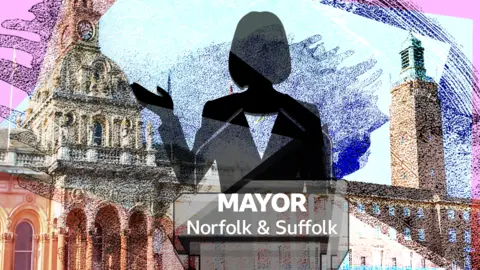Two thirds of public don't want mayor says survey
 BBC/Getty
BBC/GettyA large number of people in Norfolk and Suffolk are yet to be convinced about the benefits of an elected mayor for the two counties.
Almost two thirds of respondents to a government consultation felt a directly elected mayor would not benefit the area or improve the economy or local services.
The government wants to hold elections next year to choose the mayor who would oversee infrastructure, housing and transport and be a voice for the two counties in regular meetings with ministers.
It argues that the mayor would give local people rather than Whitehall more of a say over services and investment which Norfolk and Suffolk needs, and wants to see mayors in every part of the country.
A total of 3,115 responses were received during the eight-week consultation, with about 3,000 from individuals. Local councils, academic institutions, businesses and voluntary organisations also took part.
To the main question 'would a mayoral combined county authority deliver benefits to the area?', the two county councils and a majority of district councils along with elected representatives and local organisations agreed. But 65% of the public disagreed.
There were similar responses to the other six questions, with 61% of the public saying a mayor would not improve the local economy, 64% saying he or she would not improve social outcomes and/or local government services (67%).
A total of 59% do not expect a mayor to improve the local natural environment nor support the interests and needs of local communities or reflect local identities (71%), and 65% were not happy with the proposed governance arrangements.
Those opposed to the plans were worried about a lack of local representation and that rural and smaller communities could be ignored. There are also concerns about the cost of setting up the new authority and its complexity.
Those in favour like the idea of giving more powers to local leaders and believe the mayor would improve economic growth and strategic planning.
It is worth noting that this was not a scientific survey of public opinion. People could choose whether to respond to the consultation and it is possible that there are more people in favour of devolution than this consultation suggests.
'We must rewire the country'
In its response, the government says "for strategic decisions to drive growth, we need strong institutions at the right scale".
It points out that Norfolk and Suffolk already has a shared police force and fire service and that many public services are also delivered across large areas of the region.
"To truly get growth in every corner of the country and put more money into people's pockets, we must rewire England and end the hoarding in Whitehall by devolving power and money from central government to those that know their area best," it says.
The government adds that it will continue to work with the two county councils to establish the mayoral authority and if they continue to support the plans, Parliament will be asked to approve the mayoral elections to take place next May.
Judging from these responses it looks as if the main councils in Norfolk and Suffolk are still in favour of a directly elected mayor. But a lot of work may be needed to win over the wider public.
